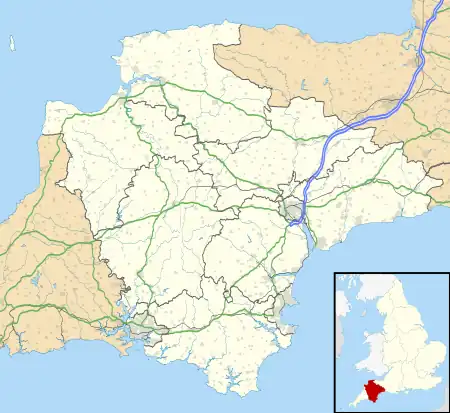| RAF Roborough | |||||||||||
|---|---|---|---|---|---|---|---|---|---|---|---|
| Roborough, Devon in England | |||||||||||
 RAF Roborough Shown within Devon | |||||||||||
| Coordinates | 50°25′20″N 004°06′32″W / 50.42222°N 4.10889°W | ||||||||||
| Type | Royal Air Force station | ||||||||||
| Site information | |||||||||||
| Owner | Admiralty Air Ministry | ||||||||||
| Operator | Royal Navy Royal Air Force | ||||||||||
| Controlled by | Fleet Air Arm RAF Fighter Command 1940-41 | ||||||||||
| Site history | |||||||||||
| Built | 1931 | ||||||||||
| In use | July 1931 - 1950 | ||||||||||
| Battles/wars | European theatre of World War II | ||||||||||
| Airfield information | |||||||||||
| Elevation | 149 metres (489 ft)[1] AMSL | ||||||||||
| |||||||||||
Royal Air Force Roborough or more simply RAF Roborough is a former Royal Air Force station in Roborough located 3.8 miles (6.1 km) north of Plymouth, Devon which used Plymouth City Airport as their base.
History
RAF Roborough began when the Air Ministry started to use Plymouth City Airport for exercises between the RAF, Royal Navy and the British Army. The Royal Navy started to use the airport in the late 1930s and was renamed RNAS Roborough however on 1 May 1942 the site was taken over by the Air Ministry for Royal Air Force use primarily for RAF Coastal Command.[2]
RNAS Roborough
The Admiralty used the airfield for various duties also the airfield played an important role during the Battle of Britain coming under partial control of the No. 10 Group RAF headquarters at RAF Box and had RAF Middle Wallop as their sector station. The first squadron to use the airfield was No. 247 Squadron RAF between 1 August 1940 and 10 February 1941 flying the Gloster Gladiator II before moving to RAF St Eval on 10 February 1941 however after seven days the squadron moved back to Roborough flying the Hawker Hurricane I before moving out for the last time on 10 May 1941 when the squadron went to RAF Portreath.[3]
- Air Sea Rescue Flight RAF, Roborough (1941)[4]
RAF Roborough
In 1942 the site was taken over by the Royal Air Force for Coastal Command Duties with No. 691 Squadron RAF forming at the airfield on 1 December 1943 flying Hurricane I's, Boulton Paul Defiant I's, Airspeed Oxford I's and Fairey Barracuda II's before leaving on 21 February 1945 moving to RAF Harrowbeer.[5]
Units
The following squasron were here at some point:[6]
The following units were also here at some point:[6]
- 'C' Flight of No. 2 Anti-Aircraft Co-operation Unit RAF
- No. 15 Group Communication Flight RAF
- No. 19 Group Communication Flight RAF
- No. 46 Elementary and Reserve Flying Training School RAF
- No. 82 Gliding School RAF
- No. 1623 (Anti-Aircraft Co-operation) Flight RAF
Later use
In the 1950s the Royal Air Force left and the site became Plymouth City Airport.[7]
See also
References
Citations
- ↑ Falconer 1998, p. 77.
- ↑ Moseley, Brian (April 2014). "Airport". The Encyclopaedia of Plymouth History. Plymouth Data. Archived from the original on 13 May 2014. Retrieved 13 February 2015.
- ↑ Halley 1988, p. 316.
- ↑ Lake 1999, p. 22.
- ↑ Halley 1988, p. 457.
- 1 2 "Roborough (Plymouth) (Plymouth City)". Airfields of Britain Conservation Trust. Retrieved 25 April 2022.
- ↑ Moseley, Brian (August 2011). "Royal Air Force Roborough". The Encyclopaedia of Plymouth History. Plymouth Data. Archived from the original on 8 March 2013. Retrieved 13 February 2015.
Bibliography
- Falconer, J (1998). RAF Fighter Airfields of World War 2. UK: Ian Allan Publishing. ISBN 0-7110-2175-9.
- Halley, James J. The Squadrons of the Royal Air Force & Commonwealth, 1981-1988. Tonbridge, Kent, UK: Air-Britain (Historians) Ltd., 1988. ISBN 0-85130-164-9.
- Lake, A (1999). Flying units of the RAF. Shrewsbury: Airlife. ISBN 1-84037-086-6.